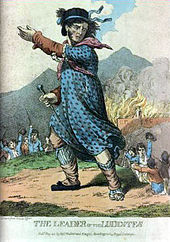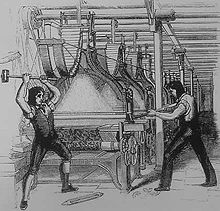- Luddite
-
The Luddites were a social movement of 19th-century English textile artisans who protested – often by destroying mechanised looms – against the changes produced by the Industrial Revolution, which they felt were leaving them without work and changing their way of life. The movement was named after General Ned Ludd or King Ludd, a mythical figure who, like Robin Hood, was reputed to live in Sherwood Forest.[1]
Contents
Background
The movement emerged in the harsh economic climate of the Napoleonic Wars and difficult working conditions in the new textile factories. The principal objection of the Luddites was to the introduction of new wide-framed automated looms that could be operated by cheap, relatively unskilled labour, resulting in the loss of jobs for many skilled textile workers. The movement began in Nottingham in 1811 and spread rapidly throughout England in 1811 and 1812. Mills and pieces of factory machinery were burned by handloom weavers, and for a short time Luddites were so strong that they clashed in battles with the British Army. Many wool and cotton mills were destroyed until the British government suppressed the movement.
Formation of movement
The Luddites met at night on the moors surrounding the industrial towns, practising drills and manoeuvres, and often enjoyed local support. The main areas of the disturbances were Nottinghamshire in November 1811, followed by the West Riding of Yorkshire in early 1812 and Lancashire from March 1813. Battles between Luddites and the military occurred at Burton's Mill in Middleton, and at Westhoughton Mill, both in Lancashire. It was rumoured at the time that agents provocateurs employed by the magistrates were involved in provoking the attacks.[citation needed] Magistrates and food merchants were also objects of death threats and attacks by the anonymous King Ludd and his supporters. Some industrialists even had secret chambers constructed in their buildings, which may have been used as hiding places.[2]
Government response
Measures taken by the British government to suppress the movement included a mass trial at York in 1812 that resulted in many executions and penal transportations.[citation needed] The Luddite movement can also be seen as part of a rising tide of English working-class discontent in the early 19th century (see also, for example, the Pentridge or Pentrich Rising of 1817, which was a general uprising but led by an unemployed Nottingham stockinger and probable ex-Luddite, Jeremiah Brandreth.) An agricultural variant of Luddism, centring on the breaking of threshing machines, was crucial to the widespread Swing Riots of 1830 in southern and eastern England.[citation needed] Research by historian Kevin Binfield[3] is particularly useful in placing the Luddite movement in historical context – as organised action by stockingers had occurred at various times since 1675, and the present action had to be seen in the context of the hardships suffered by the working class during the Napoleonic Wars.[citation needed]
"Machine breaking" (industrial sabotage) was subsequently made a capital crime by the Frame Breaking Act, 52 Geo. 3, c. 16[4] and the Malicious Damage Act of 1812, 52 Geo. 3, c. 130[5] – legislation which was opposed by Lord Byron, one of the few prominent defenders of the Luddites – and 17 men were executed after an 1813 trial in York. Many others were transported as prisoners to Australia. At one time, there were more British troops fighting the Luddites than Napoleon I on the Iberian Peninsula.[6] Three Luddites, led by George Mellor, ambushed and assassinated a mill owner (William Horsfall from Ottiwells Mill in Marsden) at Crosland Moor, Huddersfield, Mellor firing the shot to the groin which would, soon enough, prove fatal. Horsfall had remarked that he would "Ride up to his saddle in Luddite blood". The Luddites responsible were hanged in York, and shortly thereafter "Luddism" began to wane.[citation needed]
In contemporary thought
Many of the ideas that were encompassed within the Luddite Movement have been studied and evaluated in modern economics literature. The concept of "Skill Biased Technological Change" (SBTC) posits that technology contributes to the de-skilling of routine, manual tasks.[7]
In modern usage, "Luddite" is a term describing those opposed to industrialisation, automation, computerisation or new technologies in general.[8]
See also
References
- ^ "Who were the Luddites and what did they want?", The National Archives, http://www.nationalarchives.gov.uk/education/politics/g3/, retrieved 19 August 2011
- ^ "Workmen discover secret chambers", BBC News, 15 August 2006, http://news.bbc.co.uk/1/hi/england/leicestershire/4791069.stm, retrieved 11 May 2010
- ^ "Luddites and Luddism" extract from Binfield, Kevin ed., Writings of the Luddites Baltimore, Maryland: The Johns Hopkins University Press, 2004. Accessed 4 June 2008.
- ^ "Destruction of Stocking Frames, etc. Act 1812" at books.google.com
- ^ "The Malicious Damage Act, 1812 at books.google.com
- ^ Hobsbawm, Eric (1964) "The Machine Breakers" in Labouring Men. Studies in the History of Labour., London, Weidenfeld and Nicolson, page 6. Hobsbawm has popularized this comparison and refers to the original statement in Darvall, Frank Ongley (1969) Popular Disturbances and Public Order in Regency England, London, Oxford University Press, page 260.
- ^ Autor, Frank; Levy, David and Murnane, Richard J. "The Skill Content of Recent Technological Change: An Empirical Exploration" Quarterly Journal of Economics (2003)
- ^ "Luddite" Compact Oxford English Dictionary at AskOxford.com. Accessed February 22, 2010.
Further reading
- Archer, John E. (2000). "Chapter 4: Industrial Protest". Social unrest and popular protest in England, 1780–1840. Cambridge University Press. ISBN 9780521576567. http://books.google.com/books?id=pb0RzCN-ipMC.
- Bailey, Brian J (1998). The Luddite Rebellion. NYU Press. ISBN 0-8147-1335-1.
- Binfield, Kevin (2004). Writings of the Luddites. JHU Press. ISBN 0-8018-7612-5. http://books.google.com/books?id=NG6ABlDQ10MC.
- Fox, Nicols (2003). Against the Machine: The Hidden Luddite History in Literature, Art, and Individual Lives. Island Press. ISBN 1-55963-860-5.
- Grint, Keith & Woolgar, Steve (1997). "The Luddites: Diablo ex Machina". The machine at work: technology, work, and organization. Wiley-Blackwell. ISBN 9780745609249. http://books.google.com/books?id=HjijdK2VwWQC&pg=PA39.
- Jones, Steven E. (2006). Against technology: from the Luddites to Neo-Luddism. CRC Press. ISBN 9780415978682. http://books.google.com/books?id=YwPP4pGRAwgC.
- Randall, Adrian (2002). Before the Luddites: Custom, Community and Machinery in the English Woollen Industry, 1776–1809. Cambridge University Press. ISBN 9780521893343. http://books.google.com/books?id=6P_B2TeiPeYC.
- Sale, Kirkpatrick (1996). Rebels against the future: the Luddites and their war on the Industrial Revolution : lessons for the computer age. Basic Books. ISBN 0-201-40718-3. http://books.google.com/books?id=kNnmrkJFQ5cC.
External links
- The Luddite Link - Comprehensive historical resources for the original West Yorkshire Luddites, University of Huddersfield.
- Is it O.K. to be a Luddite? by Thomas Pynchon
- Luddism and the Neo-Luddite Reaction by Martin Ryder, University of Colorado at Denver School of Education
- The Luddites and the Combination Acts from the Marxists Internet Archive
Categories:- History of social movements
- Philosophy of technology
- Technology in society
- Industrial Revolution
- 19th century in the United Kingdom
- Pejorative terms for people
- History of the textile industry
- Social movements
- Agrarian politics
Wikimedia Foundation. 2010.


